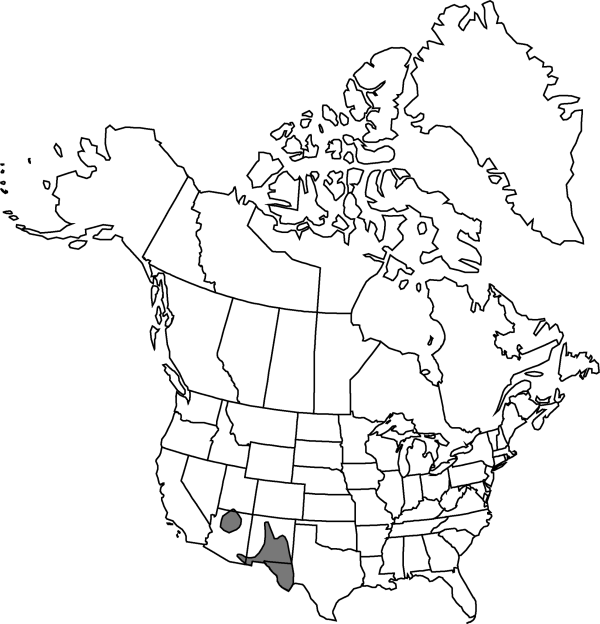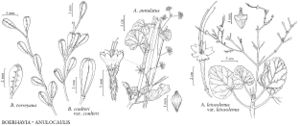Boerhavia torreyana
Contr. U.S. Natl. Herb. 12: 385. 1909.
Herbs, annual; taproot tapered, soft or ± woody. Stems prostrate or decumbent-ascending, usually profusely branched throughout, 10–80 dm, minutely puberulent with flat hairs, usually also with spreading hairs, sometimes also glandular basally, glabrous distally. Leaves mostly in basal 1/2; larger leaves with petiole 7–20 mm, blade oblong-ovate, oval, ovate, or lanceolate, 20–45 × 9–25 mm (distal leaves usually shorter, proportionately narrower), adaxial surface glabrous or sparsely and minutely puberulent, abaxial surface paler than adaxial, glabrous or minutely puberulent, sometimes glandular, neither surface punctate or both punctate with minute clusters of brown cells, base truncate, rounded, or obtuse, margins sinuate to sinuate-crisped, apex round to obtuse or acute. Inflorescences terminal and axillary, forked ca. 3–6 times unequally, diffuse, usually with sticky internodal bands; branches strongly ascending, terminating in spicate or racemose flower clusters, axis 10–40 mm. Flowers: pedicel 0.1–1.7 mm; bract at base of perianth usually soon deciduous, usually 1, broadly lanceolate to lance-attenuate, 0.5–1.2 mm; perianth whitish to purplish-pink, campanulate distal to constriction, 1–1.3 mm; stamens 2, slightly exserted. Fruits 2–12 per cluster, usually remotely spaced, sometimes about 1/2 overlapped, occasionally ± paired, straw colored to grayish tan, narrowly obovoid, 2.2–3 (–3.8) × 0.9–1.1 (–1.3) mm (l/w: [1.9–] 2.2–3.1), apex round or round-obtuse, glabrous; ribs 5, obtuse or round-obtuse, strongly rugose near sulci; sulci 0.5–1 times as wide as base of ribs, not or slightly rugose, papillate. 2n = 52.
Phenology: Flowering mid summer and early fall.
Habitat: Sandy or rocky soils in deserts or arid grasslands
Elevation: 600-1300 m
Distribution

Ariz., N.Mex., Tex., Utah, Mexico (Chihuahua), Mexico (Coahuila), South America ( in Argentina)
Discussion
Boerhavia torreyana occurs in the Chihuahuan Desert, extends north of the Mogollon Rim in arid sites, and barely enters southeastern Arizona. The slender, remotely flowered inflorescences and the papillate sulci distinguish this from other spicate species. There were fewer ants and aphids on plants of B. torreyana (reported as B. spicata) with intact internodal bands as compared to those whose bands had been experimentally altered (Y. McClelan and W. J. Boecklen 1993).
Selected References
None.
Lower Taxa
"thin" is not a number."dm" is not declared as a valid unit of measurement for this property.
